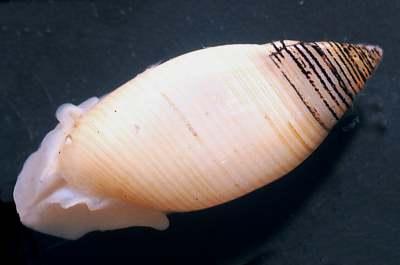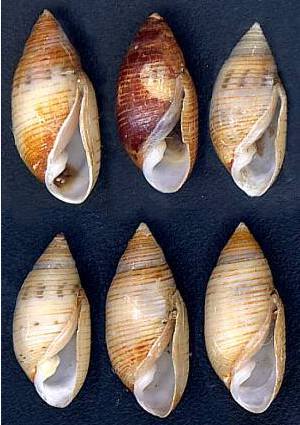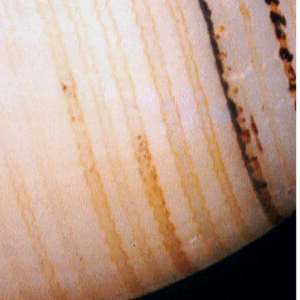

Pupa kirki
(Hutton, 1873)
Order: CEPHALASPIDEA
Superfamily: ACTEONOIDEA
Family: Acteonidae
DISTRIBUTION
North Island, New Zealand
PHOTO
Upper: Dredged between High Is and the shore, in muddy sand, Whangarei Heads, NE New Zealand, May 1963. Photo: M.C. Miller.
Lower: Shell variation. SW of Waewaetorea Is, Bay of Islands, New Zealand, 1968 AM C159690 Rudman 1971 Photo: Bill Rudman.
The shell is typical for the genus: thick, ovate, transversely sulcate; spire elevated; aperture longitudinal, narrow and basally rounded; inner lip thickened with callus; columella with large double fold, sometimes with a thin single plait above. The shell is quite variable in colour, ranging from pure white to those tesselated with black markings. The brown spiral lines often present in varying degrees, are caused by pigments in the periostracum, whereas the black pigment is in the shell layers. The spiral sculpturing of the shell is variable, some specimens only grooved at the extremities of the body whorl while others are regularly grooved all over.
The headshield is white and has a median groove which separates the pair of posteriorly facing lobes which overlap the rim of the shell. The foot is relatively small and extends back to about the posterior limit of the shell. The horny operculum is attached to the foot in the dorso-posterior midline. It is found in the North Island of New Zealand where it lives subtidally in either silty sand or fine sandy shell gravel. It can sometimes be found intertidally at extreme low water. It burrows to a depth of about 15cm but it often found buried with just the tip of its head just protruding from the sand. When burrowing it uses its head shield to deflect particles, consolidating the sides of its burrow with mucus secretions. It can retract back into its shell when disturbed and retains an operculum to partially close off the shell. It is one of the most 'snail-like' of the opisthobranchs. It feeds on sand-dwelling polychaete worms, stomach contents suggesting it specialises on sabellid worms.
- Rudman, W.B. (1971) The family Acteonidae (Opisthobranchia, Gastropoda) in New Zealand. Journal of the malacological Society of Australia, 2(2): 205-214.
- Rudman, W.B. (1972) A study of the functional anatomy of Pupa and Maxacteon (Acteonidae, Opisthobranchia) with an account of the breeding cycle of Pupa kirki. Journal of Natural History, 6(6): 603-19, 10 figs.
- Rudman, W.B. (1972) Structure and functioning of the gut in the Bullomorpha (Opisthobranchia) Part 2. Acteonidae. Journal of Natural History, 6(3): 311-24, 8 figs.
Rudman, W.B., 2003 (May 22) Pupa kirki (Hutton, 1873). [In] Sea Slug Forum. Australian Museum, Sydney. Available from http://www.seaslugforum.net/find/pupakirk
Related messages
Pupa kirki from New Zealand
June 3, 2003
From: Bill Rudman

Here are some photos of the common species of Pupa, Pupa kirki, from northern New Zealand.
PHOTOS: Upper: Dredged between High Is and the shore, in muddy sand, Whangarei Heads, NE New Zealand, May 1963. Photo: M.C. Miller. Lower Left: showing spiral grooving on shell, typical of many primitive cephalaspideans. Lower Right: Showing shell variation. SW of Waewaetorea Is, Bay of Islands, New Zealand, October 1968 Shell height 10-14mm. AM C159690. Photo: Bill Rudman.
The spiral grooving on shell [lower left photo], is typical of many primitive cephalaspideans. Often the grooves are replaced by a series of pits which are described as punctate sculpture. In this shell the pits merge into one another, creating the scalloping effect along the edge of the groove.
Best wishes,
Bill Rudman


